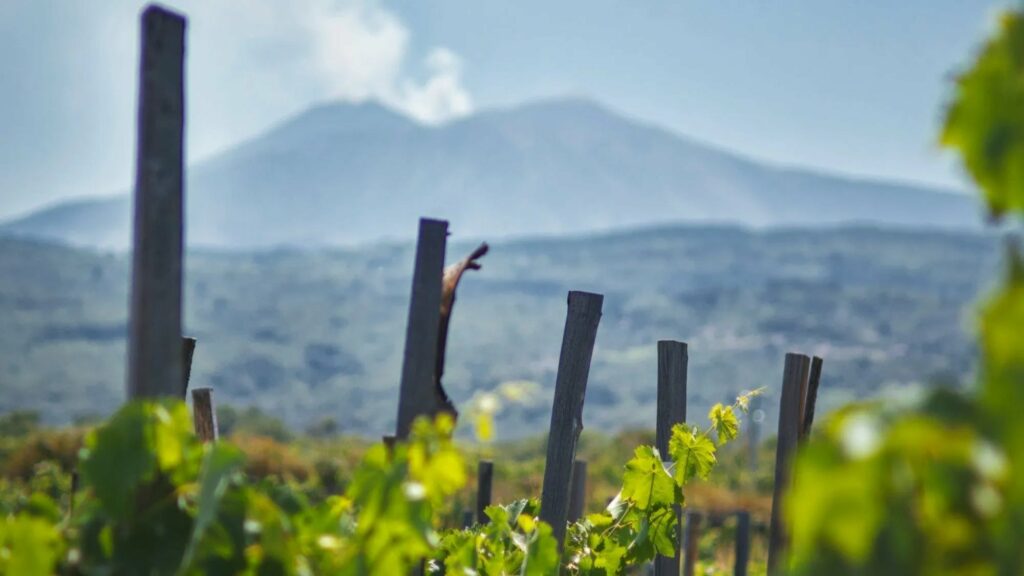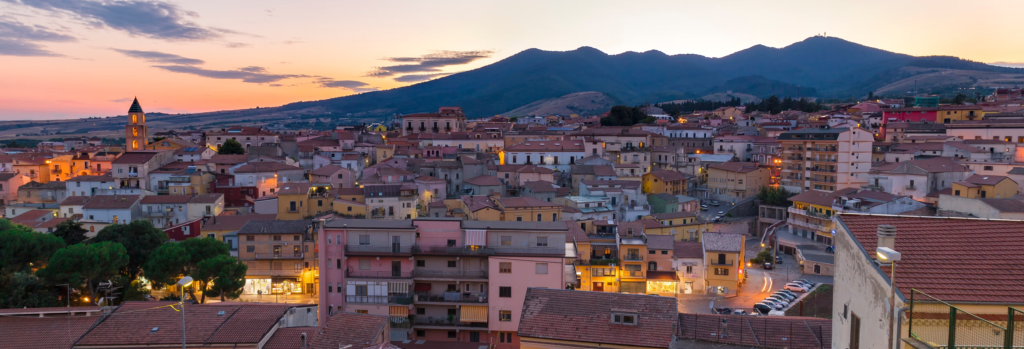Italy abounds in exceptional terroirs. Among the most fascinating are the volcanic vineyards. Between black earth, steep slopes and sulfurous mists, these regions offer unique wines. Their singular character is attracting more and more wine connoisseurs.
If you're interested in wine-related articles, download our app for IOS or Android. It will give you access to our wine lexicon, our articles and our innovative solution, designed for all wine consumers and collectors.
A land shaped by volcanoes
Italy's volcanic wines derive their richness from a mineral soil of rare complexity. Intense geological activity has enriched the soil with fertile elements. Basalt, solidified lava and ash give the grapes remarkable tension and freshness. This particular composition strongly influences the taste of the wine.
Volcanic soils absorb heat well during the day and release it slowly at night. This thermal dynamic protects the grapes from sudden changes in temperature. It also contributes to slow, even ripening.
Etna: the jewel of Etna's grape varieties

Mount Etna, in Sicily, remains the most emblematic of Italy's winegrowing volcanoes. The volcano's continuous activity does not prevent winegrowing - quite the contrary. Vines grow here at altitudes of up to 1,100 metres. This extreme elevation creates a unique climate.
Etna's grape varieties find an elegant, nervous expression here. Nerello Mascalese produces fine, taut, almost Burgundian reds. The rounder Nerello Cappuccio is often used in blends. In white, Carricante seduces with its freshness and saline notes.
Sicily's vineyards beyond Etna
Although Etna is the star of the show, other Sicilian volcanic terroirs also deserve attention. The Aeolian Islands, such as Lipari and Salina, are home to parcels suspended between sky and sea. Here, Malvasia delle Lipari expresses exotic fruitiness and beautiful minerality.
In the south of the island, the Camporeale region, although less famous, also has soil of volcanic origin. Here, passionate winemakers develop local grape varieties such as Catarratto and Inzolia. Their white wines are surprisingly pure and lively.
Campi Flegrei: the secrets of Naples
Near Naples, the Campi Flegrei is another remarkable volcanic terroir. The vines here overlook the Tyrrhenian Sea. The soil is light and sandy, but very rich in volcanic matter.
The Falanghina grape expresses itself brilliantly. It develops intense floral aromas, sometimes with a hint of iodine. The wine has a fine structure, without heaviness. The proximity of the sea adds a highly sought-after saline touch.
Basilicata: the character of the Vulture

Monte Vulture, an ancient dormant volcano in Basilicata, is another Mecca for volcanic wine. At its foot, vineyards benefit from fertile soil and a moderate continental climate.
The king grape variety here is Aglianico. It gives rise to Aglianico del Vulture, one of Italy's most powerful reds. This deep, tannic wine ages admirably. At times, it evokes the grand crus of Piedmont, while retaining a dark, mineral structure.
The benefits of Italy's volcanic wines
Wines from volcanic vineyards have many qualities. They often have marked acidity, ideal for aging. Their aromatic profile differs markedly from more classic wines. They often have smoky, stony, almost ferruginous notes.
What's more, these wines have a strong identity. Each terroir, each slope of the volcano, each grape variety tells its own story. This diversity appeals to curious wine-lovers who are always on the lookout for new sensations.
Booming wine tourism
Visiting the vineyards of Sicily or those of the peninsula offers a unique experience. The volcanic landscapes impress with their raw beauty. The cellars, often troglodytic, plunge visitors into a mysterious atmosphere.
The winemakers are often passionate about their craft. They like to share their terroir and their often artisanal working methods. On-site tastings take on a highly sensory dimension.
Some must-see estates
Tenuta delle Terre Nere (Etna): a benchmark for Nerello Mascalese, finesse and precision guaranteed.
Frank Cornelissen (Etna): natural, minimalist approach, much appreciated by demanding enthusiasts.
Cantine del Notaio (Vulture): great Aglianico with polished tannins, often aged underground.
Astroni (Campi Flegrei): superb work on Falanghina, balance and freshness on the palate.
Caravaglio (Lipari): Malvasia with tropical and mineral accents, perfect as an aperitif.
Why these wines are gaining in popularity
Italy's volcanic wines continue to seduce the international market. Their unique profile attracts customers looking for something new. Production is often limited, which makes them even more desirable.
What's more, their image is linked to that of wild nature and extreme terroirs. This appeals to a public sensitive to wines of origin and emotion.
Last but not least, their ageing potential makes them even more interesting. They evolve with elegance, gaining in complexity over the years.
If you enjoyed this article, please read the following one "Discover the secret vineyards of the Jura"which may also be of interest to you!





